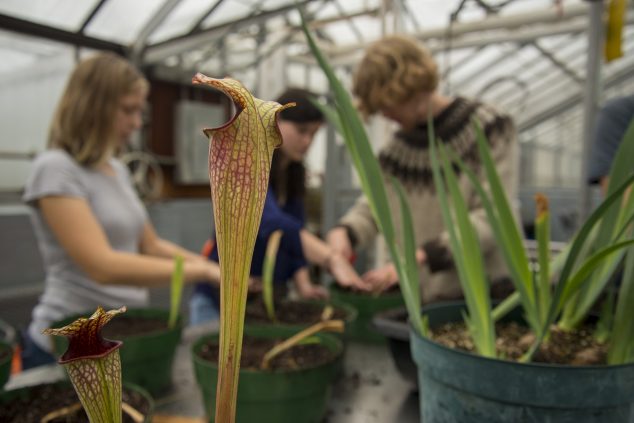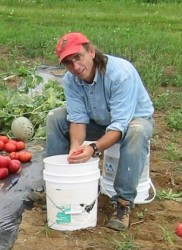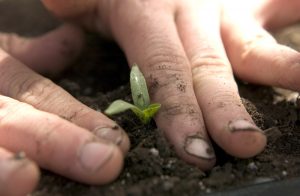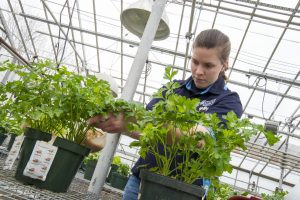B.S. Degree in Environmental Horticulture
The program offers four concentrations:
- Horticultural Business which allows further preparation for entrepreneurial career avenues within the field of horticulture. Students enrolled in this concentration have an opportunity to receive a minor in Business Administration and may elect to continue an extra year to complete a Master’s in Business Administration.
- Landscape Design which combines design skills and plant science knowledge into one curriculum.
- Sustainable Horticulture which provides an opportunity for further exploration in areas of plant physiology, nutrition, taxonomy and propagation.
- Turfgrass Management which allows further preparation for a turf-related career within the field of horticulture. Students completing this concentration will receive a well-rounded background in turf and ultimately two degrees; a B.S. in Environmental Horticulture with a concentration in Turfgrass Management (UMaine) and an A.S. in Turfgrass Management (UMass).
The B.S. degree in Environmental Horticulture explores the applied science of managing ornamental plants in public or estate gardens, residential landscapes, or greenhouses and nurseries. The program offers students the opportunity to gain theoretical knowledge and hands-on experience in
- landscape design
- landscape management
- sustainable plant production and maintenance
- greenhouse management
- plant and soil sciences
- business management
- other related fields
Program Learning Outcomes
- Students completing the program in Environmental Horticulture will demonstrate strong written, oral and interpersonal communication skills appropriate for an entry-level professional in the industry.
-
- Demonstrate scholarly writing by summarizing scientific literature, formulating individual ideas, and presenting written information clearly.
- Interact in a professional manner with community partners in a service-learning context.
- Students completing the program will be able to apply basic knowledge and skills in the field of environmental horticulture to practical, real-world settings as appropriate for an entry-level professional in the industry.
- Identify herbaceous plants, using scientific and common names, and spell both names correctly.
- Diagnose plant diseases using a microscope. They will understand principles of how disease occurs, conditions of disease epidemics, and disease management.
- Complete a field experiment to test a hypothesis addressing their research question, including appropriate control treatments, for comparison.
- Choose and describe appropriate shade tree species for use in the landscape based on the function and characteristics of the site.
- Demonstrate understanding of best practices for tree and shrub pruning, and will have the specific knowledge necessary to make pruning cuts, explain why cuts are made, and anticipate plant responses to pruning.
- Demonstrate the ability to grow high quality plants and document their ability to use environmental, nutritional, and scouting data recorded in the greenhouse to make decisions regarding plant production.
- Demonstrate the ability to measure scaled drawings with a scale ruler, apply measurements to a mathematical equation to calculate slope gradients and calculate quantities of cut/fill materials.


The Lyle E. Littlefield Ornamentals Trial Garden & The Roger Clapp Greenhouses, the University of
Maine’s horticultural research facilities, are located on the University of Maine campus.
For more information contact: Bryan Peterson (207.581.2918, bryan.j.peterson@maine.edu).
Offer an internship opportunity to UMaine Environmental Horticulture students.
Associated Faculty
-

Stephanie Burnett
Associate Professor of Horticulture
207.581.2937
-

Lily Calderwood
Extension Wild Blueberry Specialist and Assistant Professor of Horticulture
207.812.2915
-

-

Charlene Spindler Gray
Academic Program Coordinator for Environmental Horticulture and Sustainable Agriculture
207.581.2948
-

Jianjun (Jay) Hao
Associate Professor of Plant Pathology
207.581.2564
-

Mark Hutton
Associate Professor of Vegetable Crops and Extension Vegetable Specialist
207.933.2100
-

Ellen Mallory
Professor of Sustainable Agriculture and Extension Specialist
207.581.2942
-

Renae Moran
Professor of Pomology and Extension Tree Fruit Specialist
207.933.2100
-

Bryan Peterson
Interim Director & Associate Professor of Environmental Horticulture
207.581.2918
-

Rachel E. Schattman
Assistant Professor of Sustainable Agriculture
207-581-2913


